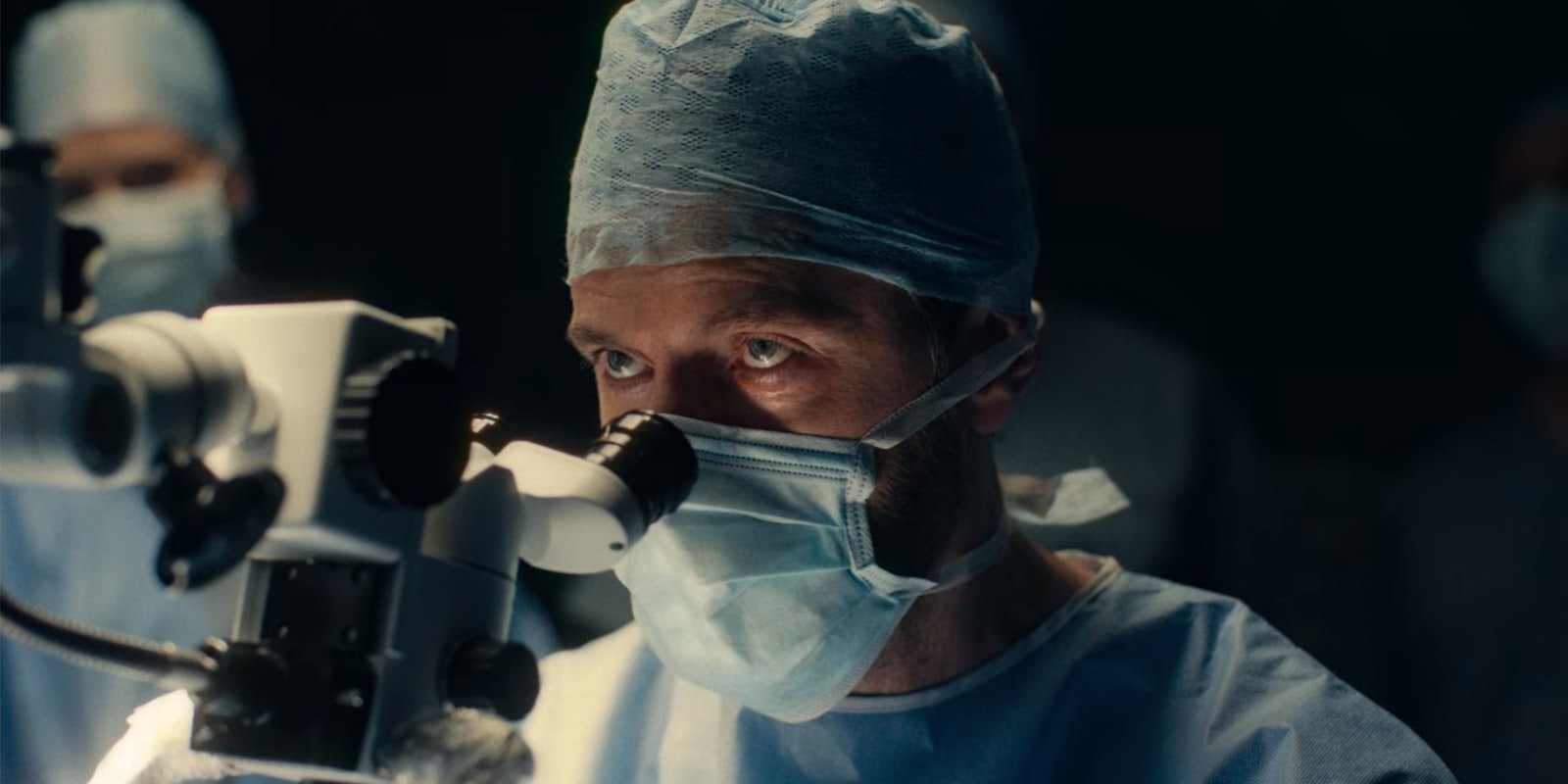“Did you get to touch her? How deep did you get?”
Two female surgeons stand side-by-side with identical faces.
Each is an identical twin hoping to pass themselves off as someone they are not; one twin is too nervous to consult with an attractive patient. While they work, they talk about the patients on whom they are operating and subconsciously lusting, sharing intimate details with such candid vigor that it undoubtedly crosses a line of professionalism.
At the same time, each woman holds such a haughty sense of power over what she controls at work that it all blends into a form of behavior she can reason away as “acceptable.”
The viewers want the fantasy of professionals acting on selfish desire as much as the characters themselves do—and thus a new sense of unhinged hedonism on TV is born.
We want to be known deeply, including the unsavory parts we often keep hidden. That’s exactly what the surgeons described above hint at. As a result, the rise of the sexy surgeon has gripped audiences bingeing TV this year.
The sex appeal of selfishness
The guilty parties are Amazon Prime Video’s remake of David Cronenberg’s Dead Ringers, featuring the twin surgeons, and Netflix’s take on the Josephine Hart novel Damage, rebranded as Obsession.
Both get so down and dirty that they make surgeons irresistibly sexy. Dead Ringers focuses on the work of twin gynecologists Beverly and Elliot Mantle (both played by Rachel Weisz), who are using their ground-breaking research to get ahead in the scientific field.
In contrast, Obsession follows surgeon William Farrow (Richard Armitage), who embarks on an affair with his son’s girlfriend. Each doesn’t just take us—rather viscerally—under the knife but adds a sadomasochistic edge to people who should be trusted community figures.
They examine the chokehold of cruelty, passion, and self-importance that televised surgeons have on their lives and attentive viewers.
In short, it’s all incredibly hot. Why? Both Dead Ringers and Obsession are treading where no previous medical show has dared to go by redefining abhorrent and evil actions as selfish sexiness.
Though Dead Ringers and Obsession are alike in thinking, each program has a distinct way of tackling the thinly veiled balance between pleasure and pain.
Sticking with the bare bones of the original 1988 film, Dead Ringers elevates its plot by arguing that women in STEM can have it all. In this case, it’s two successful leaders in their field who secure multi-million dollar deals, revolutionary women’s healthcare, multiple lovers, as many burgers to eat as they can physically get their hands on, and zero consequences for any of it when things inevitably go wrong.
The Mantle twins eat, spend, and have sex as frugally as the men we’ve historically seen at the top of the food chain, while purely driven by their lust for science.
Obsession’s William matches the twins in his ability to bring his profession into the bedroom, engaging in light BDSM with his son’s fiancée while slicing deep cuts between his family ties with callous precision. Unlike the Mantle twins, he acts purely on selfish indulgences without much aspiration for the future.
Coasting on what life has already given him, why would he need to do anything else?
The historical sexiness of villains
These shows don’t contain completely original concepts: We have seen surgical sexiness somewhere before.
Back in 2003, Nip/Tuck set the standard for surgical sexiness, all while examining the “beauty is pain” rhetoric surrounding cosmetic surgery. Dr. Sean Mcnamara (Dylan Walsh) is an epicenter of passion, lust, and beautiful women, while Dr. Christian Troy consumes the role of the commercially handsome playboy.
The seductively surreal then passed the baton onto Grey’s Anatomy—a medical drama so loaded with steamy sex scenes that keeping track of them is as difficult as avoiding ill-advised hospital relationships. However, there’s a stark difference: Nip/Tuck often got bogged down in its misogyny, while Grey’s Anatomy, now in its 19th season, has overstayed its welcome.
Regardless of new TV surgeons often behaving irrefutably badly, viewers can’t help but be hooked by the “bad boy” (or girl) attitude. It’s no secret that the role of the villain has historically got us hot under the collar, with characters such as Game of Thrones’ Jaime Lannister and Dynasty’s Alexis Carrington both fitting the bill for ruthless fiends with a sexy side.
Nip/Tuck’s Dr. Christian Troy behaves badly more frequently than he’d like to admit, while Derek “McDreamy” Shepherd’s reputation in Grey’s Anatomy didn’t fare as well in the real world. At their heart, both shows are easy commercial watches; we don’t usually see challenging concepts intersect with medical drama.
Sure, there are plenty of TV surgeons that are downright cold and standoffish—just look at Grey’s Anatomy fan favorite Cristina Yang—but there isn’t typically a sense of self-assured provocativeness… until now.
Dead Ringer’s ‘Freudian mess’ vs. Obsession’s BDSM
In contrast to the type of medical dramas we’re used to seeing, the 2023 additions of Obsession and Dead Ringers present new possible reasons why seductive—yet psychologically questionable—professionals are more satisfying to watch.
“Dead Ringers is amazing to me because it says so much about women’s health and the problems of capitalist healthcare, but still keeps the messy problematic characters of the [1988] Cronenberg original,” fan Billie Walker said in an interview with the Daily Dot.
Messy and problematic sound like traits many of us embody, but the Mantle twins take this further by creating personal and professional problems that could end their careers, as well as their lives.
“The season has more time to reckon with the Freudian mess that is the Mantle twins,” Walker continued. “The gender flip helps, yet they still have that cocky surgeon vibe that is both a red flag and a massive turn-on.”
The success of Obsession, meanwhile, largely relies on its depiction of power play in the bedroom.
Obsession star Sonera Angel praised the show for making BDSM more accessible in an interview with Filmhounds magazine.
“The scene where William has a rope around Anna’s thigh was probably the first time I’ve seen someone being tied up and it hasn’t looked grotesquely artistic and voyeuristic,” Angel said. “It wasn’t uncomfortable at all—it looked like it could be quite pleasing.”
Dominant sexual behavior such as choking breaks up the monotony of sex, while power play in the bedroom is more widely understood as a major turn-on. These aren’t entirely new concepts, but audiences are more comfortable with them.
Despite Angel’s praises, however, Obsession’s use of BDSM wasn’t as nuanced as it could have been, at least one critic has argued.
“Erotic thrillers aren’t exactly Netflix’s specialty,” Rory Doherty explains in his review for Telly Visions. “Obsession doesn’t capture the tactile sultriness we’ve seen in legitimate dominatrix stories, not to mention that the depiction of BDSM summons the worst traits of ‘90s erotic cinema… colored as aggressive and controlling, the behaviors of damaged people who need it to express something repressed and messed up—rather than just an expression of ordinary sexual desires.”
With an average Rotten Tomatoes score of 84%, Dead Ringers easily trounces the somewhat woeful 27% Obsession has to its name—mostly due to the lack of plot outside of the steamy sex.
“With Dead Ringers, in particular, almost every base is covered,” psychotherapist Livia Shepherd told the Daily Dot. “The gender stereotypes [the Mantle twins were men in the original film] are thrown out of the window, and they’re also able to play God. The fact that there are two of them also means they’re covering a whole range of social facets—wealth, class, intellect, power, and psychological intrigue.”
‘Big Surgeon Energy’
Why do medics playing God turn us on?
“I think it’s just that they are cocky but they have a right to be so. It’s actually reinforced by their skill—Big Surgeon Energy, if you like,” Walker theorized.
It’s human nature to both want to have control and relinquish it, which could explain why someone who can seemingly do both will whet the audience’s appetite.
A powerful lawyer or advertising executive pushing and pulling his sadistic sexual power is old news (just look at Mad Men’s Don Draper). But a doctor, nurse, or other community idol who is supposed to be squeaky clean at all times? It’s nearly scandalous.
This new type of sexy surgeon adds to the quality of creative output. Our collective attention spans are shorter than ever, and the market saturation means that a mind-scratching limited series will probably lose out to Love Is Blind.
But what’s more eye-catching than a dominant, yet evasive, figure going beyond the limits of sexuality and professionalism? Shepherd told the Daily Dot that our fascination with this type of character could be as multi-faceted as it seems.
“There’s definitely ‘White Coat Syndrome’ here, meaning people in positions of power that seem to have superior knowledge to the layperson,” Shepherd explained.
Shepherd argued that understanding characters and their motives will make them more attractive.
“I think it’s just that they are cocky but they have a right to be so,” Walker added. “It’s actually reinforced by their skill—Big Surgeon Energy, if you like.”
These surgeons can know us, make us lust for them, and lead us astray. If surgeons on TV continue to be framed this way, perhaps we will eventually let them.
As one anonymous medical professional said: “Surgeons are perceived as sexy because they are sexy. It’s a fact.”




